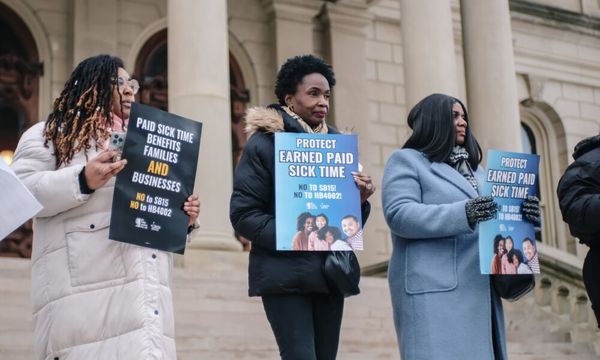As Chicagoans maneuver around torn-up streets and sidewalks while utility crews install new underground gas pipelines, City Hall announced a climate-fighting plan Thursday that envisions the end of fossil fuel hookups to homes and buildings.
Mayor Lori Lightfoot’s administration announced more than two dozen recommendations from outside advisers representing advocacy, business and labor interests to cut emissions from homes and buildings that add to the climate crisis.
Among the recommendations, Chicago would require new residential or commercial construction to be built without any gas or other fossil fuel-burning equipment, such as heating systems or appliances. A “fossil fuel mitigation fee” would be added to construction that chooses to use gas.
That proposal is being made even as utility Peoples Gas is spending billions of dollars to lay hundreds of miles of new underground pipes across the city and plans to do so through 2040.
In a statement, the utility said it is “reviewing the report and believe the mission of the [city advisory group] is well intended.” The utility is exploring its own plans for reducing greenhouse gas emissions, the statement added.
“It’s clearly pointing toward a future where Chicago is not on the gas system, and that’s good. It’s where we want to go,” said Abe Scarr, a member of the city’s advisory group and director of public interest advocacy organization Illinois PIRG.
Many of the recommendations would need to be put into new policy goals by Lightfoot, but some can be acted on relatively soon thanks to millions of dollars in federal funding largely from the COVID-19 stimulus package last year, said Angela Tovar, the city’s chief sustainability officer.
Buildings account for more than two-thirds of greenhouse gas emissions in Chicago, Tovar added, noting the urgency to act.
“The burning of fossil fuels is no longer a viable option,” Tovar said.
The city is already looking at “decarbonizing” some city libraries, for instance, she said.
Another recommendation from the report: The city should follow the lead of nonprofit Elevate, which is helping low-income residents pay for conversion to all-electric heating and hot-water sources, replacing gas.
Helping all the city’s residents make the transition to clean energy is important, she said.
“This can’t be a situation where we leave anyone behind,” Tovar said.
Elevate, along with the Natural Resources Defense Council, helped compile the report with Lightfoot’s office.
As most homes in Chicago rely on natural gas for heating, hot water and cooking, it’s important to address the gas emissions, Elevate Chief Executive Anne Evens said.
“We don’t have a lot of time to address climate change, and that means dramatically reducing emissions,” Evens said. “This does provide a blueprint for moving forward.”
Brett Chase’s reporting on the environment and public health is made possible by a grant from The Chicago Community Trust.







